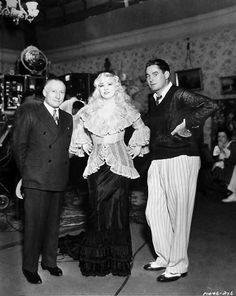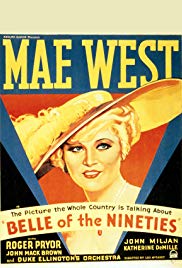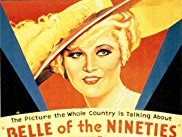Belle of the Nineties **** (1934, Mae West, Roger Pryor, Johnny Mack Brown, John Miljan) – Classic Movie Review 7491
Director Leo McCarey’s irresistible 1934 musical comedy drama Belle of the Nineties is a highspot for the 41-year-old Mae West in her fourth film, following She Done Him Wrong and I’m No Angel, both co-starring Cary Grant. She is still considered one of the all-time top ten funny ladies of the movies.
With her own screenplay, based on her original story It Ain’t No Sin, here is the great Mae West vamping deliriously away as a saloon singer attraction called Ruby Carter ringing the bell of two beaux, prizefighter Tiger Kid (Roger Pryor) and saloon owner Ace Lamont (John Miljan) of the New Orleans The Sensation Club. One turns out to be a jewel thief, which helps her make up her mind, when Tiger is set for a title match with champ Ace, who has him steal some of Ruby’s jewels.
If you like lines like ‘a man in the house is worth two in the street’, and who does not?, this Mae Western is for you. OK it is not really a Western as it set in New Orleans, but otherwise it has the hallmarks and the atmosphere.
West sings the classic ‘My Old Flame’ the Duke Ellington Orchestra, with the original music by Arthur Johnston and lyrics by Sam Coslow reworked by Duke Ellington, who naturally also pops in. She also sings ‘Memphis Blues’ and ‘St Louis Blues’, written and published in the 1910s by W C Handy, though the film is set in 1890s New Orleans.
Also in the cast are Johnny [John] Mack Brown, Katherine DeMille, James Conlan, Stuart Holmes, Harry Woods, Mike Mazurki, Edward Gargan, Libby Taylor, Warren Hymer, and Benny Baker.
Jack Wagner provides additional dialogue.
It Ain’t No Sin was to have been the film’s title until the censors objected. According to David Niven, originally more than 40 parrots were trained as a publicity stunt to repeat ‘It Ain’t No Sin’ and were released into the jungles of South Africa, still squawking ‘It Ain’t No Sin’.
Different scenes were shot for different cities and states, and for New York, the final scene was re-shot to include a marriage ceremony.
The Tiger Kid role was intended for George Raft, Mae’s co-star in her first film Night after Night (1932), but he turned it down and stage actor Roger Pryor was hired.
© Derek Winnert 2018 Classic Movie Review 7491
Check out more reviews on http://derekwinnert.com

Mae West poses with Paramount head Adolph Zukor (left) and director Leo McCarey on the set of 1934’s Belle of the Nineties.



